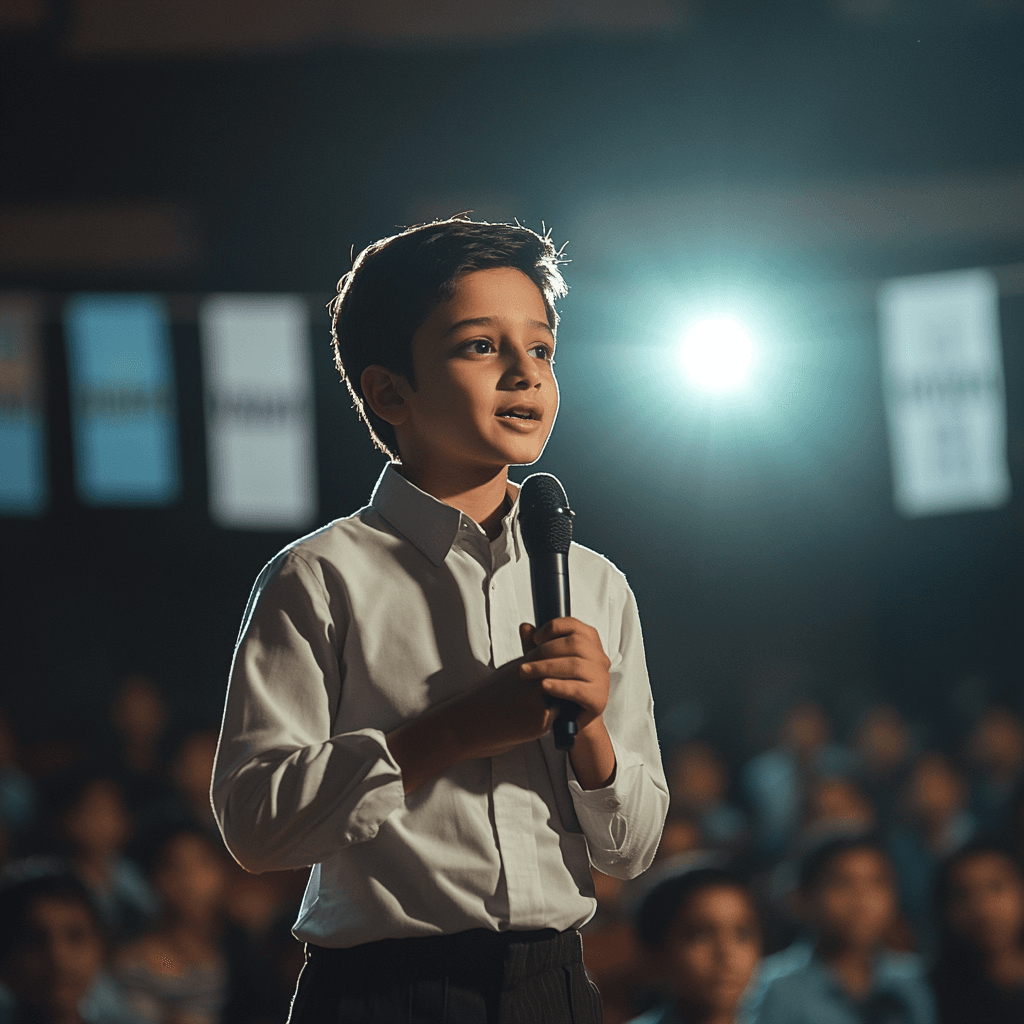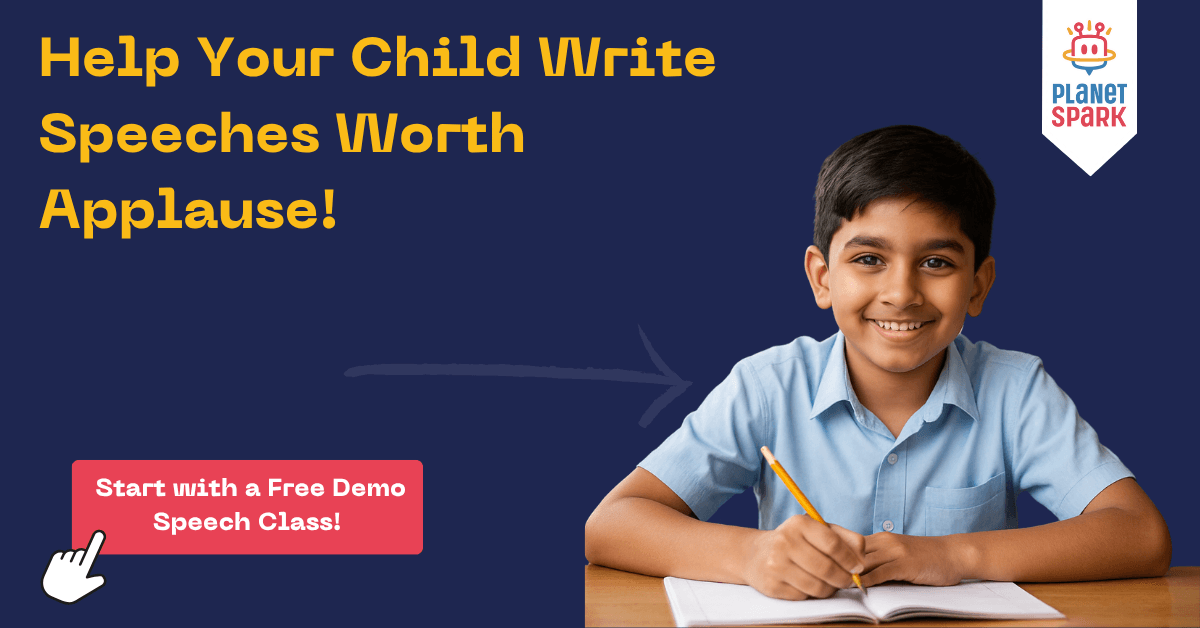How to Write a "Respecting Others" Speech for Kids
Last Updated At: 17 Jul 2025
7 min read

Respect is more than just politeness. It’s the key to healthy friendships, teamwork, and confident communication. When kids learn the importance of respecting others, they grow into better listeners, kinder speakers, and stronger leaders.
At PlanetSpark, we teach children to speak confidently while valuing different opinions. Through public speaking, storytelling, and creative writing classes, kids learn to share ideas with empathy, whether it’s in a debate, a group project, or on stage.
Sample Speech 1: For Beginners (1 Minute Speech)
Title: Respect Starts With Us
Good morning, everyone,
Today, I will talk about respect. Respect means being kind to others, listening when someone speaks, and treating people the way we want to be treated.
At school, we show respect by helping friends, not interrupting teachers, and sharing things. At home, we respect our parents and elders by following rules and speaking politely.
When we respect others, they will respect us too. This makes our world peaceful and happy.
Let’s all try to be respectful every day.
Thank you!
Sample Speech 2: Story-Based Speech (2 Minutes)
Title: The Magic of Respect
Hello everyone,
Have you ever seen how a smile can change someone’s day? That is what respect feels like. It is a small action that makes a big difference.
Last week in my class, one of my friends made a mistake while reading aloud. Some children laughed, but I decided to clap and say, “Good try!” After that, others joined in. My friend smiled and felt confident again. That is the magic of respect because it makes people feel better, not worse.
Respect is about more than just being polite. It is about accepting others, even when they are different from us. It is listening, sharing, and speaking kindly.
If we all respect each other, school becomes a place where everyone feels safe and happy. Let us make that happen!
Thank you!

Every confident speaker starts with one idea.
Book a Free Demo Class Today
Sample Speech 3: For Advanced Speakers (3-Minute Speech)
Title: Respect: The Heart of Good Communication
Good morning, respected teachers and friends,
Today, I want to talk about something that matters in every conversation. That is respect.
Respect is not just about saying "please" and "thank you." It is about listening, understanding, and accepting that people have different ideas.
When we speak in public, respect is very important. We may have strong opinions, but we must share them politely. If someone disagrees, that is okay. We listen, we respond kindly, and we keep the discussion peaceful. This is how debates and speeches become meaningful.
Respect helps us:
- Make new friends
- Solve problems without fighting
- Become better leaders and listeners
I believe the world can be a better place if we all speak with kindness and respect. So next time you stand on a stage or talk to a group, remember. Your words can make someone feel small or special. Choose respect.
Thank you!
Why "Respecting Others" Is a Great Public Speaking Topic for Kids
Choosing to "respect others" as a public speaking topic helps children grow as speakers and individuals. Here’s why:
It’s a Relatable Topic
- Every child has experienced respect or disrespect.
- Kids can easily share personal stories, making the speech authentic.
It Builds Communication and Social Awareness
- Speaking about respect teaches kids how to express feelings clearly.
- It improves emotional intelligence by helping them consider other perspectives.
It Encourages Confidence with Moral Topics
- Children learn to speak about values, not just facts.
- This builds leadership skills and the courage to share important ideas.
It Teaches Persuasion
- Kids learn how to convince others kindly, without arguments.
- They practise using polite language to inspire change.
It’s Perfect for Different Speaking Formats
- Useful for extempore speeches, debates, recitations, and storytelling.
Can be adapted for school assemblies, competitions, or classroom discussions.

Kind words can change the world. Teach your child to speak them confidently.
Book a Free Demo Class Today
What Happens When Kids Speak on Respecting Others
“Why should we respect others?” is a powerful topic for public speaking for kids. It teaches children not only what respect means but also how to communicate this important value to an audience.
When kids prepare a speech on the importance of respecting others, they practise:
- Organising thoughts clearly
- Expressing values in simple, relatable ways
- Building empathy and connection with listeners
- Using storytelling techniques to share real-life examples
- Speaking confidently about moral and social issues
This topic helps children practise both their speaking and their emotional intelligence, making it a perfect choice for school speeches, elocution contests, or debate club activities.
Tips to Help Kids Write a Speech on Respect
Many children know what respect means, but they may struggle to turn that idea into a speech. Here’s how parents and teachers can guide them:
Start with a Personal Connection
Ask your child to think of a moment when they felt respected or disrespected. Starting with a real example makes the speech genuine and relatable.
Example opening line:
“I remember the time my friend shared his toys with me when I was sad. That day, I learned what respect feels like.”
Use the Rule of Three
Public speaking becomes easier when kids organise their ideas into three simple points. For a speech on respect, they could cover:
- What is respect?
- Why is it important?
- How can we practise it every day?
This structure keeps the speech clear and easy to follow.
Practice Out Loud
Speaking confidently comes with practice. Encourage your child to:
- Read the speech aloud several times
- Practice in front of a mirror
- Record themselves on a phone or camera
- Get feedback from family or friends
The more they practise, the more natural their delivery will become.
Confidence begins when a child shares their voice. Give yours the platform to begin."
Book a Free Demo Class Today
Use Simple Language and Body Language
Remind kids to:
- Speak slowly and clearly
- Use gestures to show feelings (like smiling or using hand movements)
- Look at the audience while speaking
- Pause between points for a better impact
These tips help build confident communication skills.

Let the Experts Handle This
Writing and delivering a speech on respect is a valuable learning experience for kids, but it can feel challenging without the right guidance. That is where PlanetSpark steps in.
We help children become confident public speakers through:
1:1 Personal Trainers: Every child is paired with an expert trainer who guides them step by step, from brainstorming ideas to delivering the final speech.
AI-Led Video Feedback (SparkX): Kids record their speeches, get instant feedback on voice, expression, and confidence, and improve faster.
Daily Writing Practice (Spark Diary): Regular writing exercises help kids build clear, structured thoughts, which is perfect for speech writing.
Learning Clubs: Kids join storytelling and debate clubs to practise speaking in front of peers in a supportive and fun environment.
Public Speaking Contests: Regular competitions build real-world confidence and help kids handle stage presence with ease.
At PlanetSpark, kids do not just memorise speeches. They learn to speak from the heart, with clarity, kindness, and respect.
Conclusion
Respect is one of the most important values children can learn, and public speaking is a great way to practise it. When kids speak about respect, they are not just giving a speech. They are learning to communicate with empathy, listen to others, and become thoughtful leaders.
Whether it is in a classroom, on a stage, or at home, teaching children to speak with kindness will prepare them for a lifetime of meaningful conversations.
If your child is ready to build confidence, communication skills, and leadership qualities, help them take the first step today.
FAQs
Why is "Respecting Others" a good topic for public speaking?
It teaches children to speak on moral values, builds empathy, and helps them practise sharing personal experiences with clarity.
Can public speaking help my child become more respectful?
Yes. Public speaking helps children think about how they express ideas. It teaches them to listen, respond politely, and value other opinions.
What are other moral topics for public speaking?
Other topics include kindness, honesty, teamwork, gratitude, and helping others.
How can I help my child practise speeches at home?
Start with small topics like family rules or friendship. Encourage your child to speak in front of the mirror, record videos, or present to family members.
Personalized Communication Report
Record a video to get a AI generated personalized communication report for your child
Select Learner's Class

Hi There, want to try these
tips for your child with
LIVE with our expert coach?
Let's check your child's
English fluency